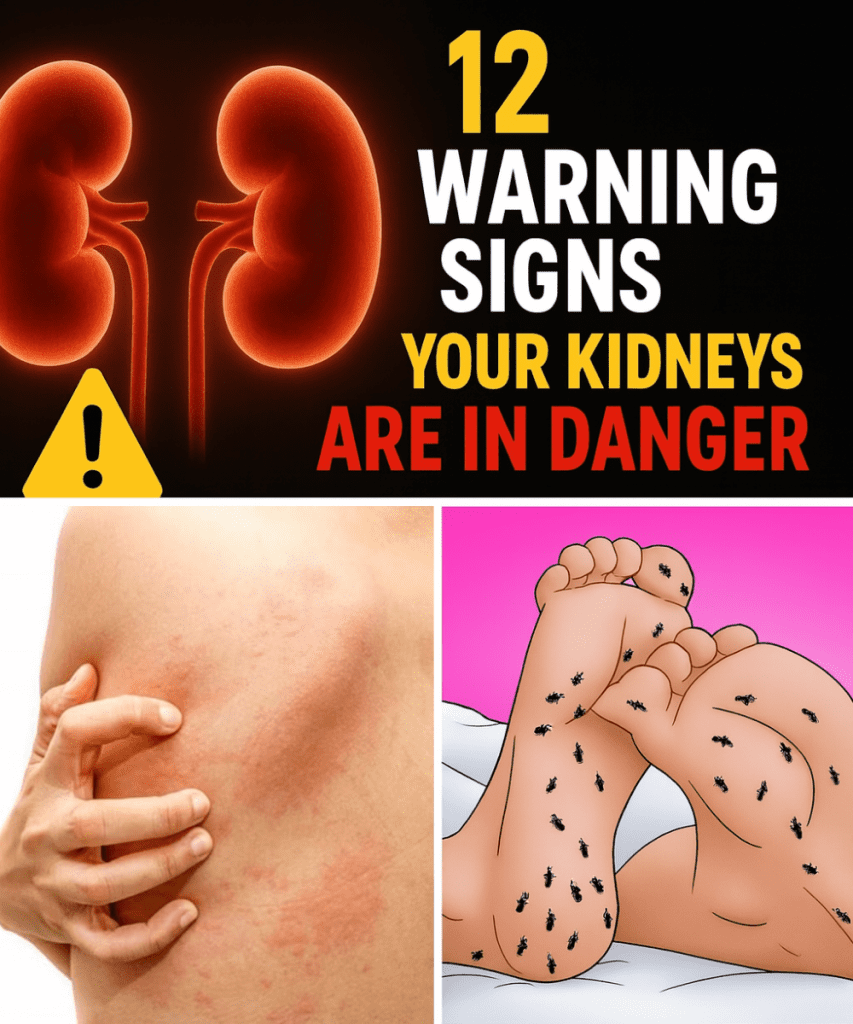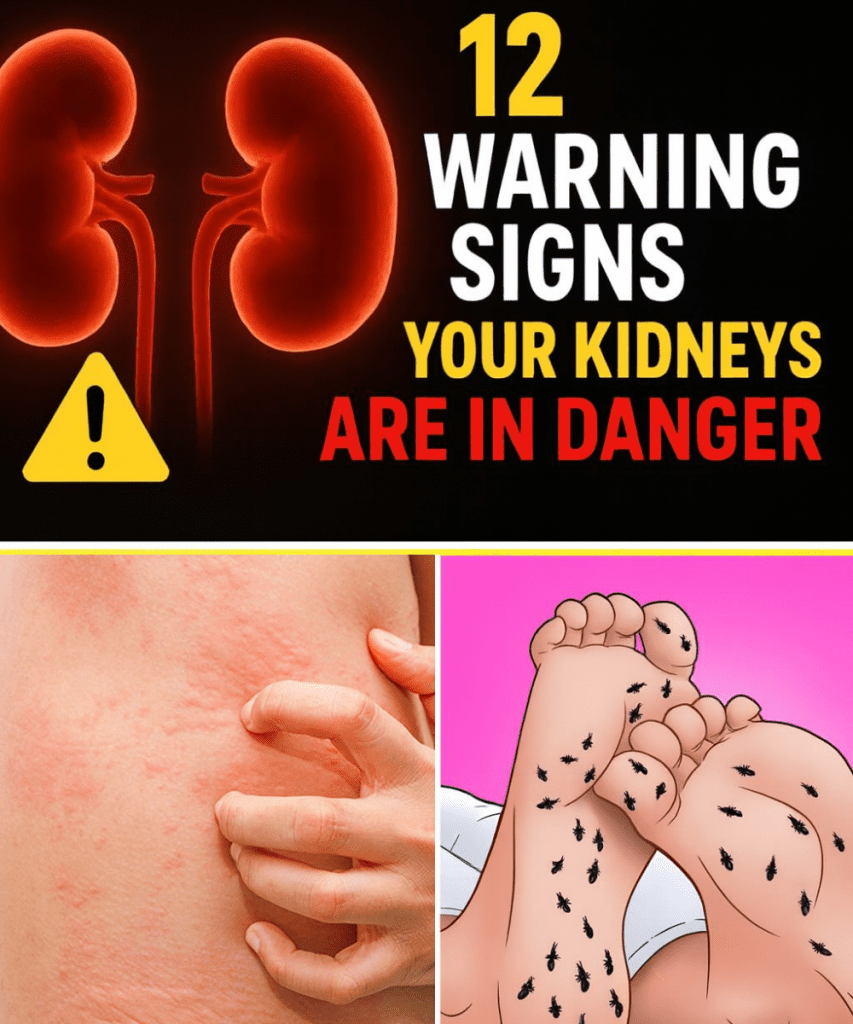Your kidneys are the unsung heroes of your body, quietly filtering toxins, balancing fluids, and keeping your blood pressure in check. But when they start to struggle, the warning signs can be so subtle they’re easy to brush off as everyday aches or stress. Ignoring these signals could lead to serious kidney disease, impacting millions—37 million Americans alone are affected, and most don’t even know it.
These seven strange signs are your kidneys’ way of whispering for help. Pay attention, and you could catch a problem before it becomes life-altering. Ready to listen to your body? Let’s uncover the clues and take action to protect your kidney health today.

🌟 Why Your Kidneys Matter More Than You Think
Your kidneys filter about 50 gallons of blood daily, removing waste, regulating electrolytes, and even helping produce red blood cells. When they’re not functioning properly, toxins and fluids build up, leading to complications like chronic kidney disease (CKD), kidney failure, or even heart issues. Early detection is critical—CKD often shows no symptoms in its early stages, yet it affects 1 in 7 adults.
The good news? By recognizing these unusual signs and acting fast, you can protect your kidneys and prevent long-term damage. Here’s what to watch for.
🛑 7 Strange Signs Your Kidneys Need Help
1. ⚡ Persistent Fatigue and Low Energy
Feeling drained no matter how much you rest? When kidneys struggle to filter waste, toxins accumulate in your blood, sapping your energy and leaving you sluggish. This isn’t just “feeling tired”—it’s a deep, unrelenting fatigue that could signal kidney trouble, especially if paired with other symptoms.
2. 👁️ Puffy Eyes, Especially in the Morning
Waking up with swollen, puffy eyes that linger? This could be a sign your kidneys are leaking protein into your urine instead of keeping it in your body. Known as proteinuria, this is an early red flag for kidney damage and warrants a check-up.
3. 🦶 Swelling in Hands, Ankles, or Feet
Kidneys regulate fluid and sodium balance. When they falter, excess fluid builds up, causing swelling (edema) in your hands, feet, ankles, or even your face. If your shoes feel tight or your rings won’t fit, your kidneys might be struggling to keep up.
4. 🚽 Foamy or Bubbly Urine
A few bubbles in your urine are normal, but persistent foaminess that looks like frothy beer could indicate too much protein (albumin) in your urine. This condition, called proteinuria, is a hallmark of kidney damage and should never be ignored.
5. 👅 Metallic Taste or Bad Breath
A strange metallic taste in your mouth or persistent bad breath (often called “uremic breath”) could mean urea is building up in your blood due to poor kidney function. This can also lead to a loss of appetite, as food may taste “off.” If this sounds familiar, it’s time to talk to your doctor.
6. 🌵 Itchy, Dry Skin
Healthy kidneys balance minerals like calcium and phosphorus in your blood. When they fail, imbalances can cause dry, itchy skin that no lotion seems to fix. This irritation is often linked to mineral and bone disease, a common complication of advanced kidney disease.
7. 🧠 Brain Fog, Dizziness, or Trouble Focusing
Struggling to concentrate or feeling dizzy? Kidney issues can lead to anemia, reducing the oxygen your brain needs to function. This can cause brain fog, memory issues, or frequent dizziness—subtle signs that your kidneys may not be delivering enough red blood cells.

🩺 What to Do If You Notice These Signs
Don’t wait for these symptoms to worsen. If you’re experiencing one or more of these signs, especially if you have risk factors like diabetes, high blood pressure, or a family history of kidney disease, take action now:
- Schedule a Check-Up: Ask your doctor for kidney function tests, including:
- Adopt Kidney-Friendly Habits: Protect your kidneys with simple lifestyle changes:
- Monitor Symptoms: Keep a journal of your symptoms to share with your doctor. Early detection can slow or even halt kidney disease progression.
🌍 Why Early Detection Could Save Your Life
Chronic kidney disease affects millions worldwide, yet it’s often called a “silent” condition because symptoms may not appear until significant damage has occurred. Left untreated, CKD can progress to kidney failure, requiring dialysis or a transplant. But with early intervention, you can preserve kidney function and avoid serious complications like heart disease or anemia.
By paying attention to these subtle signs, you’re taking the first step toward protecting your health. If you’re at risk—due to diabetes, high blood pressure, or a family history—regular check-ups and screenings are essential, as CKD can be detected through blood and urine tests even before symptoms arise.
✨ Take Charge of Your Kidney Health Today
Your kidneys don’t scream for attention—they whisper through strange, easy-to-miss signals. From puffy eyes to foamy urine, these seven signs are your body’s way of sounding the alarm. Don’t ignore them. By acting early, you can safeguard your kidneys and enjoy a healthier, more vibrant life.
Schedule that check-up, make kidney-friendly choices, and listen to your body. Your kidneys are working hard for you—return the favor by giving them the care they deserve. 🌿









